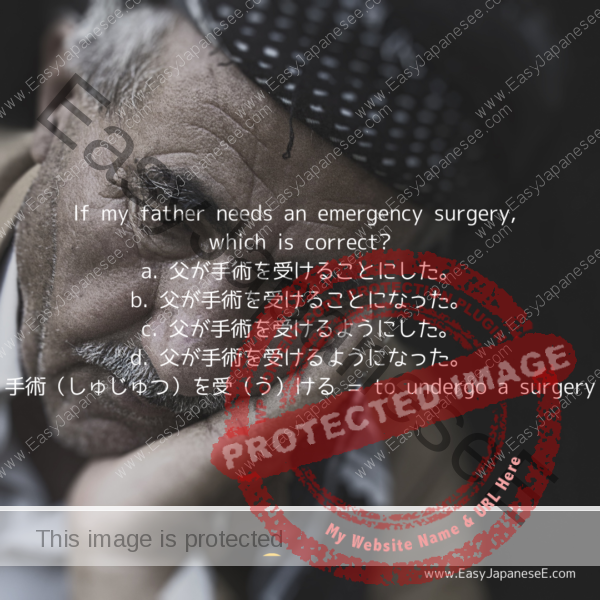
If my father needs an emergency operation, which is correct?
a. 父(ちち)が手術(しゅじゅつ)を受けることにした。
b. 父(ちち)が手術(しゅじゅつ)を受けることになった。
c. 父(ちち)が手術(しゅじゅつ)を受けるようにした。
d. 父(ちち)が手術(しゅじゅつ)を受けるようになった。
手術(しゅじゅつ)を受ける = to undergo a surgery
All 4 sentences are legitimate sentences but they all mean different things:
a. My father decided to undergo a surgery.
b. It is decided that my father undergo a surgery.
c. I have arranged my father to undergo a surgery. (Or My father has made a conscious effort to undergo a surgery.)
d. (although he was refusing surgeries before,) My father started to (willingly) accept a surgery.
So, the correct answer under an emergency situation is b. 父(ちち)が手術(しゅじゅつ)を受けることになった。
[non-past plain verb] + ことになる means “the circumstances warrants [a person] to do ….” or “~ (will) result in …” It is usually used to describe a situation which the person cannot avoid and/or an action the person is unwilling to do. For example:
コロナウイルスのせいで、うちで仕事(しごと)をすることになった。
Due to the corona virus, I have resulted in working from home.両親(りょうしん)が離婚(りこん)したので、祖母(そぼ)と暮(く)らすことになった。
As my parents got divorced, I ended up living with my grandmother.このままだと、浪人(ろうにん)することになるだろう。
If the circumstances don’t change, I will end up spending another year studying before getting accepted to a university.あの二人(ふたり)は別(わか)れることになった。
Those two have ended up splitting up.
However, when people get married, lots of people say:
結婚(けっこん)することになりました。
instead of
結婚(けっこん)することにしました。
Usually ~することにする describe a person’s decision to do something (for more example, click here), so as long as you are willingly getting married it should be 結婚(けっこん)することにしました。There are a few reasons for this:
- There are many people and many things to consider before getting married, so 2 people deciding to get married is not enough for it to happen.
- Until not that long ago, most marriages were arranged, so people used to say 結婚(けっこん)することになりました all of the time and if you say or do 結婚することにしました, they must have been shunned by their family.
- Many Japanese people (especially of my generation and older) tend to prefer to say ことになる even when ことにする is more appropriate, because when things don’t go as we had planned, することにする imposes a lot more responsibility upon us while we can blame the circumstances if it was the case of することになる… (this is a very sinister view, isn’t it? but I’m thinking of myself…)
So if you see/hear sentences like below, we cannot really know if the person involved is willing or unwilling:
東京(とうきょう)の大学(だいがく)に行(い)くことになりました。
It has been decided that I go to a university in Tokyo.オーストラリアに引(ひ)っ越(こ)すことになりました。
It has been decided that we move to Australia.転勤(てんきん)することになりました。
It is decided that I get transferred to another office (somewhere far away).どうして日本語(にほんご)を勉強(べんきょう)することになったんですか。
How come you have ended up studying Japanese?新しい本が出ることになりました。
It has been decided that a new book will come out.
For ようになる and ようにする, please click the relevant link for explanation and examples.
If you’ve liked this post, please share it with your friends using your social media accounts.
EasyJapaneseE’s Basic Grammar Exercise Modules
Following short modules are available for subscription! Click the name of a module for more information.
![[non-past plain verb] + ことになる](https://www.easyjapanesee.com/wp-content/uploads/2020/11/201110-することになる.png)

One Reply to “[non-past plain verb] + ことになる”